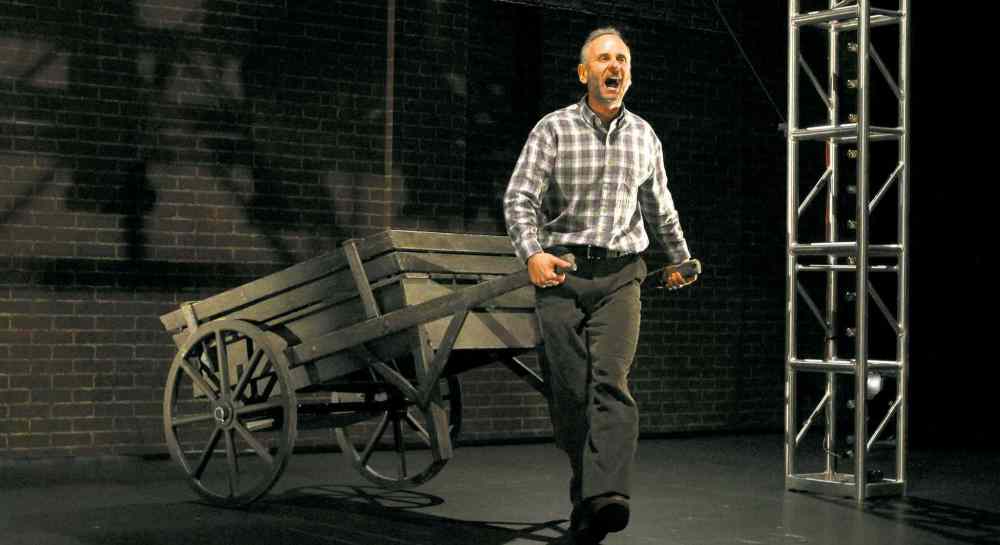Theatre founder’s story harrowing and heartfelt
Advertisement
Read this article for free:
or
Already have an account? Log in here »
To continue reading, please subscribe:
Monthly Digital Subscription
$0 for the first 4 weeks*
- Enjoy unlimited reading on winnipegfreepress.com
- Read the E-Edition, our digital replica newspaper
- Access News Break, our award-winning app
- Play interactive puzzles
*No charge for 4 weeks then price increases to the regular rate of $19.95 plus GST every four weeks. Offer available to new and qualified returning subscribers only. Cancel any time.
Monthly Digital Subscription
$4.99/week*
- Enjoy unlimited reading on winnipegfreepress.com
- Read the E-Edition, our digital replica newspaper
- Access News Break, our award-winning app
- Play interactive puzzles
*Billed as $19.95 plus GST every four weeks. Cancel any time.
To continue reading, please subscribe:
Add Free Press access to your Brandon Sun subscription for only an additional
$1 for the first 4 weeks*
*Your next subscription payment will increase by $1.00 and you will be charged $16.99 plus GST for four weeks. After four weeks, your payment will increase to $23.99 plus GST every four weeks.
Read unlimited articles for free today:
or
Already have an account? Log in here »
Hey there, time traveller!
This article was published 30/11/2013 (4419 days ago), so information in it may no longer be current.
For most Winnipeggers, John Hirsch stands like his statue in front of the Royal Manitoba Theatre Centre, a curious gesticulating figure frozen in time, his importance long lost on most passersby.
Performed down the street at the RMTC Warehouse, Hirsch, a one-man show by performer Alon Nashman and its director Paul Thompson, brings the local and national legend to vibrant life for his adopted hometown audience. It was hard not to leave Thursday’s opening night fascinated by this passionate man, full of awe at what this Hungarian refugee accomplished and feeling a flush of pride about the city’s illustrious theatre roots.
Hirsch probably belongs on the mainstage that bears his name, but is being presented at the Warehouse, christened for his fellow MTC co-founder Tom Hendry.

Nashman and Thompson compellingly capture the brilliance, abrasiveness, humour and tenacity of the man, along with the lasting pain of his tortured childhood as a Holocaust survivor; the silent screams set off by his memories of horror are especially searing.
Nashman fills the stage with a stirring performance of the heavily accented title character, as well as others in Hirsch’s life. He sings and dances, but also steps outside the role to become himself, an actor who divulges the way the director in his horn-rimmed glasses impacted his life and career. At the start, Nashman informs the audience he wants to make sure Hirsch is not forgotten, yet that doesn’t stop the fan from getting into an argument with his hero. Hirsch flees the stage, irate that Nashman’s vision will never do him justice. Nashman responds by calling Hirsch “Winnipeg’s most prickly prick.”
The most famous production during Hirsch’s tenure at MTC, and the one that put the theatre on the map, was Mother Courage and Her Children, Bertolt Brecht’s war epic that brought out the New York City critics to see stage star Zoe Caldwell. Nashman’s Hirsch pulls Mother Courage’s iconic cart, an image for the harrowing upbringing the orphan carried in his memory and soul. Beautiful moments capture in seconds the evil of the coming Holocaust. Nashman whirls around the stage, joyously dancing a Viennese waltz which suddenly devolves into chilling goose-stepping. Then the story is told about how Hirsch is forced by Hungarian Nazis to whitewash over the stars on the ceiling of his small town’s synagogue before Nazi thugs drag the rabbi into the streets to slit his throat.
Orphan
It is from that agony that came the fire in Hirsch’s belly. He was an orphan left to starve in Europe at 13 and walks to the top of the Eiffel Tower to scream, “I’m not dead.” He searches for a new home that by pure happenstance became Canada — and Winnipeg because of its location in the middle of the continent. Within a decade of arriving here unable to speak English, this artistic prophet had built his most miraculous creation, MTC, the first regional theatre in North America.
He quickly becomes a crusader for Canadian content, arguing that theatre is an essential community service that has nothing to do with balancing books or making a profit. He takes on the cultural establishment at the Stratford Festival and CBC, demanding that Canadians must tell their own stories.
Several times Nashman and Thompson allow us into Hirsch’s rehearsals and we get to see the tyrant who struck fear into the hearts of his actors. One aspiring Caliban from Shakespeare’s The Tempest becomes Hirsch’s whipping boy when his performance is judged unacceptable. Hirsch’s brutal honesty was not only targeted at the unknown, but also the celebrated, such as Broadway star Frank Langella, who learns in a face-to-face confrontation with Hirsch that he is not a top talent. The playwrights also drop such names as former Winnipegger Len Cariou, Martha Henry and even disgraced impresario Garth Drabinsky.
The bearded and lean Nashman is near flawless in his execution of this demanding script that is not always clear as to who is talking or what their significance is. He is accompanied periodically on stage by a pair of female stage managers, who are typically unseen in most stage productions, but bring Nashman stage props such as a megaphone, puppets and other items.
Hirsch went to “the big thrust stage in the sky,” at the age of 59 in 1989, and earned this heartfelt tribute that concludes with a fitting evocation of his lasting impact on Canadian theatre.
kevin.prokosh@freepress.mb.ca


